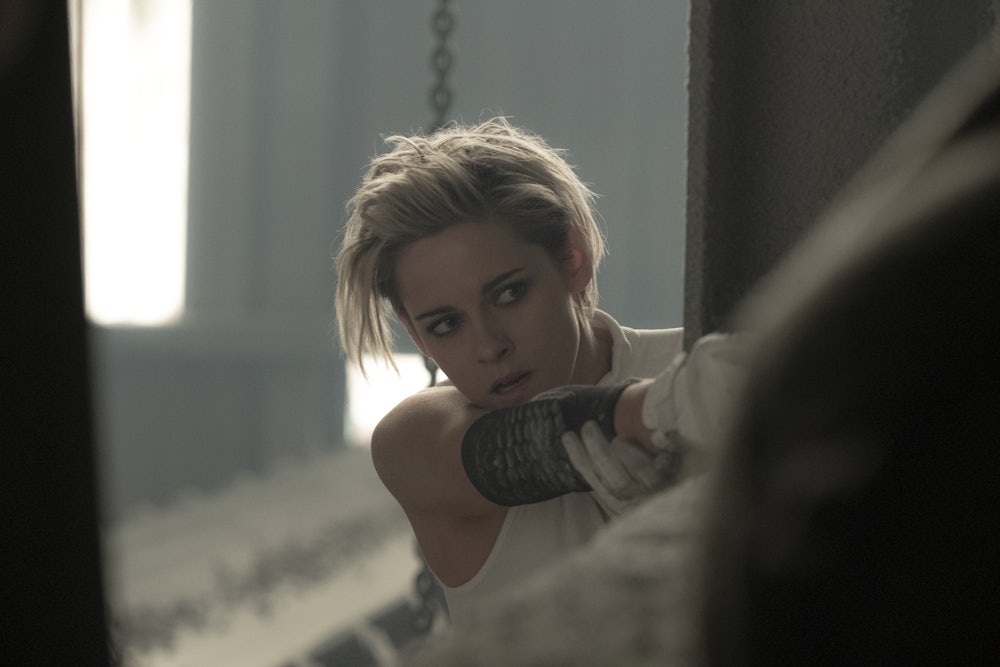The deeply silly late-1970s television show Charlie’s Angels is a camp artifact, the tale of three comely lasses jiggling their way to justice. It’s not exactly Shakespeare or the Ramayana, the sort of thing that inspires artists through the centuries. Nevertheless, almost two decades after the director known as McG transformed the sexploitative series into a big-screen celebration of girl power starring Cameron Diaz, Drew Barrymore, and Lucy Liu, Elizabeth Banks has transformed it again into ... a big-screen celebration of girl power.
Of course she has. It’s not exactly rich source material and, to Banks’s credit, she goes all in, with all the subtlety you expect of mainstream Hollywood. Charlie’s Angels was always a fantasy. But where once it was a masculine diversion—pretty ladies punching and kicking—now it’s a feminist project.
Plot is mostly immaterial—this is more spectacle than cinema, and you could follow along even if you were barely conversant in English. Charlie’s Angels posits a world in which women (mostly young, uniformly beautiful) kick ass and take names. Our heroes are Jane (Ella Balinska) and Sabina (Kristen Stewart), mercenaries in the employ of some shadowy agency (it doesn’t matter). Their client is Elena (Naomi Scott), a corporate whistleblower. Their handler is Bosley, and Banks directs herself in the role.
Jane and Sabina are meant to protect Elena; naturally she becomes the third angel. There are luxury cars and picturesque locations in Berlin and Istanbul. Like most such movies, this is a series of set pieces involving gunfights, chases, disguises. It’s not played straight, as in, say, Tom Cruise’s Mission: Impossible films, but with a wink that’s often over the top, like the James Bond pictures starring Roger Moore.
Every woman is tough but also loves getting dressed up; every man is a bad guy. Well, #NotAllMen. There’s the Saint (Louis Gerardo Méndez), the Angels’ helpmeet, offering vegan ice cream and electrolyte-enhanced water after a tough day on the job; and Langston (Noah Centineo), Elena’s assistant, mostly tasked with being adorable; and their preposterously handsome mentor (Djimon Honsou), looking like he’s wandered in from a Paul Smith store.
This is a mostly sexless universe—though I personally welcome Jonathan Tucker’s tattooed assassin to kill me any day—save Kristen Stewart’s Big Dyke Energy. Stewart’s queer signaling remains subtext, but teens will pick up on it even if their parents miss the point. Stewart is a charismatic star, which, in this kind of film, matters more than being a good actor. Stewart’s performance is flip and tongue-in-cheek, and, again, I thought of Moore’s Bond. But while it strained belief to think of women falling at the feet of the puffy, fifty-something 007, her swagger is seductive and self-aware and potent.
Balinska has an icy, British cool; Scott a broad, comic incredulity; Banks does her usual deadpan cuteness (she’s a strange hybrid of Parker Posey and Anna Faris). The chemistry among the four is subdued, or perhaps only seems so because the movie insists that it is just so fierce when women get together and … do stuff. It’s essentially the same message the Spice Girls preached: Sisterhood is empowering. The Angels are a band of mercenaries, but they’re also something of a sorority.
Certainly no one should expect anything more complex from a Hollywood entertainment. The message of Charlie’s Angels probably seems subversive to the suits who ponied up the tens of millions of dollars to make this movie. More discouraging than the fact that it got remade is the fact that the story’s moral hasn’t changed one bit since Diaz, Barrymore, and Liu were the ones telling it. At least that movie had a catchy song by Destiny’s Child.
Crude as the story is, it relies on the texture of real microaggression. Elena is a scientist who has developed some new technology that promises to solve the world’s energy crisis, but her creep of a boss notes, “It can be manufactured in pastel colors for the ladies.” Later, when she’s sneaking into corporate headquarters, the smarmy security guard urges her to “smile.” You can’t miss the point.
But I’m not sure mere sisterhood can conquer the patriarchy. Elizabeth Banks directed, produced, wrote, and co-starred here—an actual feminist triumph in a business controlled by men. It would have been truly remarkable had her film declined to dress itself up as a serious intellectual project. Men get to make meaningless movies, and Charlie’s Angels could have been a great one of those without all this nutritious moralizing.
There’s a tossed-off joke at the film’s end that Ruth Bader Ginsburg is herself an Angel. That feels quite right. The popular culture has turned one of our actual feminist heroes into a cartoonish figure—you know the shtick: the Notorious RBG. It’s well-intentioned, but all this you-go-girl esprit de corps is beginning to ring a little hollow. I love Beyoncé, but she’s patently wrong in that girls don’t run the world. Maybe it’s not possible to make a fun film that’s willing to admit that fact or envision some actual redress to inequality. That truth is just too depressing.
